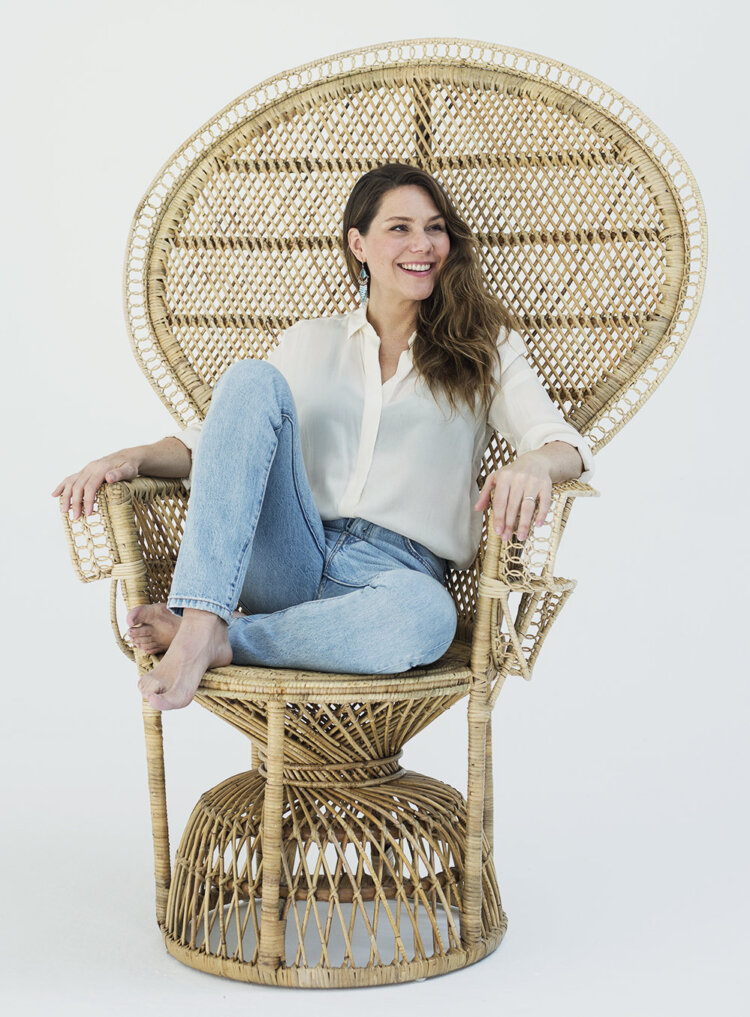
I started Grok Nation to cultivate empathy as a writer and a thinker. There are so many things I don’t understand or agree with, but to live together peacefully we must learn to see others’ perspectives.
That’s why I reached out to Erika Lust, a filmmaker, director, producer, and the owner of a large and successful women-powered production company. She prides herself on ethical practices in hiring and treatment of her employees. Her business is successful, creative, and motivated by, in her own words, “a desire to better our understanding of sexuality and the role of women.”
What is Erika Lust’s business? She is an adult film director and producer that breaks the mold of porn. Erika Lust is not what you think of when you think of a pornographer. She is, first of all, a woman in a business dominated almost entirely by men. Erika has never performed in adult films, and she is a wife, a mother of two young girls, and an incredibly articulate and intelligent woman.
I read about Erika in a very intense article in The New York Times Magazine about how porn is shaping our children. Her story was also featured in the first episode of Netflix’s documentary series Hot Girls Wanted: Turned On (“Women on Top”), directed by Rashida Jones. What struck me was Erika’s exceptional way of speaking about an industry typically dominated by misogyny, damaging depictions of women, the mistreatment of women in particular, and the destruction of sex and sexuality as we know it.
I wanted to know more about Erika and her choices and motivations for her work. I was especially curious how she and her seemingly very nice husband ran a business like this while raising two daughters. I reached out to Erika and we had a fascinating conversation.
Erika, like many of her generation (she was born in 1977) discovered porn when she was a young woman. In an attempt to understand more about herself and her life and sexuality, she reached out to porn to watch other people “doing it.”
Okay, got it. It’s not what I did, but I’m not judging here! (Not yet, at least!) “My first experiences with pornography were that I felt quite awkward with what I was looking at,” says Erika. “I felt that it didn’t really have much to do with what I was looking for. It felt to me that it was very man-centered. There were the kinds of stories where the women were reduced to some object and it wasn’t really their story. They were there to help the men have their pleasure. And as a young woman, I was looking for my own pleasure! My first reaction to porn was that it didn’t really work for me and that porn is probably a genre that is exclusively for men.”
Erika’s exploration of sexuality and the role of pornography did not stop there. She says she wanted to understand why porn was designed and presented in this way, because she was studying political science at the time and was driven and trained as an academic to understand how the world works. “I came upon a book by Linda Williams, who was a film professor at Berkeley at the time called Hard Core: Power, Pleasure, and ‘the Frenzy of the Visible’. The book made clear to me that porn was actually a representation of our discourse about sexuality. And when we watch porn, we unknowingly (and sometimes knowingly) see gender roles in sexuality and we often believe that the way we see things in porn is the way we are supposed to act.”
Wow. I was officially crushing a little bit on Erika Lust. This is an educated woman whose desire is to understand things from the inside out. Erika learned that there were some women’s voices in the adult film industry in the 1980s, and she started to get very interested in the notion that sexuality from a woman’s point of view could be brought into the industry.
So how does a political science student with plans to work in an international organization for women’s rights and human rights become a filmmaker and trailblazer in this field? Erika left her home country of Sweden in 1997 and moved to Spain. She had some friends working in a few advertising production companies and she started as a runner/gopher. She worked on sets in many different capacities and learned about directing, script writing, sound and cameras.
Erika made her first short film in 2004. “I really didn’t have the ambition of becoming ‘Erika Lust’; I was just ‘Erika with the short film.’” While she says that her first film, technically speaking, is not her best work, she sees in that first attempt the soul of what she wanted to create. She says the actors connect to each other in a totally different way, the story revolves around the woman and her desires. It’s about what she wants to do.
I really didn’t have the ambition of becoming ‘Erika Lust’; I was just ‘Erika with the short film.’
Erika’s short was not a huge success. She literally kept it in her drawer for a year before she submitted it to a festival. And then this little film started to win awards in alternative erotic film festivals. She put it on the internet for free and started to write a blog about feminism, pornography and sexuality. Within a few short weeks, her film had 2 million views. People were writing her to say how different this was than the porn normally presented. Many told Erika that this was the first time they had seen something that depicted explicit sex but was different. There were emotions and a real concrete artistic motivation behind it. Connecting with characters on an erotic journey was a new kind of presentation of sexuality and this, for many, was a welcome change from most porn, which focuses primarily on the male completion of a sex act.
Erika’s new life had started. As she continued working in the film industry as a freelancer, she interacted with people all over the world who wanted to share their stories about sex and sexuality and their interests and fantasies. Erika found the notion of real information from real people incredibly rich and she seized on this opportunity to explore another side of human sexuality in her filmmaking. She began to catalogue people’s fantasies, love stories and ideas and turned them into a project called XConfessions, which has released more than 100 short films.
When Erika laid it all out like this, I started to lose some of my preconceived judgment. I started to see her as a businesswoman and creator of film—which may not be for everyone but certainly serves a purpose. And I saw Erika as a courageous artist who wants to change how people get information about their sexuality in a world that uses this industry to educate, whether we like it or not.
I still had a lot of leftover preconceived notions about people who work in this industry. I can’t deny it. And I expressed this to Erika who replied with a laugh, “I am totally a normal person. I am a wife and a mother. Many people who are sex workers and who work in the adult industry are also normal. It’s a myth that it’s promiscuous, strange, perverse people. It’s a lot of ordinary people trying to make a living.” Erika highlighted how different it is for those who work behind the camera versus the performers in adult films. The stigma against their work is much more prominent, and Erika knows she is “saved” from some of that because of her position as filmmaker. In addition, she says, “I interact very little with the mainstream adult industry, so I kind of feel like an outsider.”
So…what about her kids? Like, I have a hard enough time worrying about how I will explain porn to my kids. How does Erika handle it with 7 and 10 year old daughters?
“They are fully aware that we make films for adults,” she says. “We make films where people are having sex and where people are naked. My daughters understand that they can’t watch scary movies because if they watch scary movies or violence, they will likely feel very uncomfortable and they will probably not sleep that night. And I have explained to them that the same can happen with adult content and erotic images that are not meant for their age.”
I like how Erika presents this. She also points out the importance of raising children to be open-minded about the beauty of the sexual body in age-appropriate ways. “I tried to talk to them about sex in a very natural way from the beginning of their lives so that they are aware of their bodies,” she says. “So that they know what sex is, they know how it works and what reproduction is. They know what a clitoris is; they have that kind of knowledge. And I’m proud of that.”
Ultimately, Erika speaks to a problem society has not with porn, but with sex and with children’s access to explicit material. “We know that porn has become sex education for even very young kids today,” she says. “Most parents think that children are starting to search for porn when they are maybe 13 or 14, but it can start as young as 10. Even if you are very careful in your home and you have protection on your kids’ devices, someday they might go to their cousin’s house or to a friend’s house, and we can’t entirely control the world we live in.”
She’s right. Sure, you can micromanage every second of your kids’ lives, but it’s not realistic to do so if you want to build a healthy relationship with your kids. They’re going to be out of your sight. And people may present them with opportunities to look at porn. I do think the conversations Erika is initiating can have a significant positive impact on how we view our society’s obsession with sex, our film industry’s obsession with degrading women, and the desire to raise children respectful of their bodies and the bodies of others.
I asked Erika if we need porn. Like, part of me wants to make it go away so we don’t have all of this conflict. Here’s what she says:
“We don’t need porn. We need water and we need food and we need sleep and those kind of basic things are what we really need. Porn is something that we want. It’s not something that we need, it’s something that we want. And watching other people having sex I think has to do a lot with our own exploration of desire, of who we are. What turns us on? I think we are curious. So we don’t need porn. We don’t need iPhones either. We want them, though.”




 Read More From Mayim
Read More From Mayim
Grok Nation Comment Policy
We welcome thoughtful, grokky comments—keep your negativity and spam to yourself. Please read our Comment Policy before commenting.